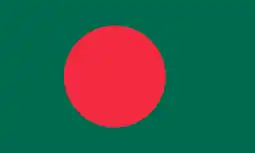Jobbarer Boli Khela
Boli Khela or Bali Khela[1][2] (Bengali: বলীখেলা) is a traditional form of wrestling in Bangladesh, particularly popular in the Chittagong area considered as a national game of the district.[3] It is a form of combat sport involving grappling type techniques such as clinch fighting, throws and takedowns, joint locks, pins and other grappling holds. It is one of the oldest traditions of the Chittagong. The sporting event, held in the first month of the Bengali year date of 7th, always takes place at Madarsha Union as Mokkaro boli khela & same month date of 12th, always takes place at Laldighi Maidan as Jabbarer Boli khela.[4]
_(19204236770).jpg.webp) Two players (boli) playing Boli khela in Chittagong | |
| Focus | Grappling |
|---|---|
| Hardness | Full Contact |
| Country of origin | |
| Famous practitioners | Didarul Alam, Marma Singh |
| Parenthood | Historic |
| Olympic sport | No |
| Part of a series on the |
| Culture of Bangladesh |
|---|
 |
| Traditions |
| Religion |
| Sport |
Etymology
Boli means wrestler[5] or a powerful person in Bengali, while Khela denotes a game. So, Boli Khela means game of the powerful person.[1]
History
Boli Khela was introduced in the last 19th century by Kader Boxo. He was a landlord and resident of Satkania Upazila under Madarsha Union in Chittagong district. Reportedly, beginning in 1879, during the first month of each year, he collected dues from his renters and arranged a boli khela match. After his death, the 7th of Boishakh, the first month of the Bengali calendar year, started being called "Mokkaro Boli Khela".
A 20th century merchant, Abdul Jabbar Saodagor from Chittagong, arranged a boli khela in 1907 match to cultivate a sport that would prepare the youth to fight against British rule. Broad appeal for the sport began at the end of the First World War but subsided at the end of the Second World War.[6][7]
Participation
The arena is either a circular or square shape, measuring at least fourteen to twenty feet across. Rather than using modern mats, Boli wrestlers train and compete on dirt floors. Match started in a sandy wrestling ground.[8] Each year, Boli Khela attracts new participates and fans because the sheer enjoyment of the sport is not only contagious for local enthusiasts but inspires tourists to Bangladesh an opportunity to get a glimpse of an exciting and unique event.[7] Fans of many countries come every year to see Boli khela.
Rules
The event starts at afternoon in a festive mood with the music of 'Dabor' (one kind of folk drum)and 'Sanai' (folk flute).[9] Each match lasts about 25–30 minutes but if both competitors agree, the length of the final match may be extended up to 10–15 minutes.[8]
Great practitioners
- Didar Boli, a trader from Omkhali under Ramu upazila in Cox's Bazar district.[6]
- Oli Hossain of Brahmanbaria district.[9]
- Marma Singh, a sub inspector of Gulshan Police Station in Dhaka.[10]
See also
References
- Haque, Mahbubul (2012). "Bali Khela". In Islam, Sirajul; Jamal, Ahmed A. (eds.). Banglapedia: National Encyclopedia of Bangladesh (Second ed.). Asiatic Society of Bangladesh.
- "Jabbarer Boli Khela begins April 25". New Age. Dhaka. 17 April 2013. Archived from the original on 3 November 2013. Retrieved 8 June 2013.
- Bangladesh. Ministry of Cabinet Affairs, Establishment Division
- "Jabbar-er Boli Khela and Baishakhi Mela in Chittagong". The Daily Star. 28 April 2010. Retrieved 8 June 2013.
- "Jobbarer Boli Khela begins April 25". Daily Sun. Dhaka. 22 April 2013. Archived from the original on 3 November 2013. Retrieved 8 June 2013.
- Zaman, Jaki (10 May 2013). "Jabbarer Boli Khela: Better Than WWE". The Independent. Dhaka. Archived from the original on 4 November 2013. Retrieved 8 June 2013.
- "Jabbarer Boli Khela tomorrow". The Daily Star. 24 April 2013. Retrieved 8 June 2013.
- "Didar, Marma Singh Tripura joint champions". The Daily Star. 26 April 2008. Retrieved 12 September 2013.
- Chakraborty, Pranabesh; Chowdhury, Tymur Jahan (26 April 2012). "Grocer Oli new champ". The Daily Star. Retrieved 11 September 2013.
- "Grocer Oli new champ". Bangladesh News. 26 April 2008. Retrieved 12 September 2013.